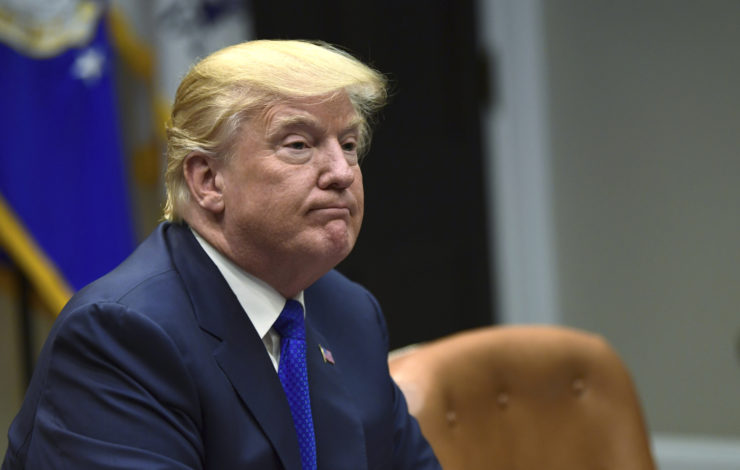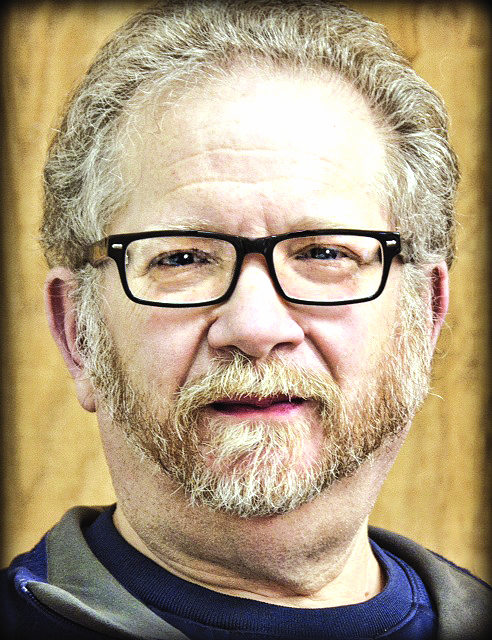
President Donald Trump pauses as the media departs after he spoke in the Roosevelt Room of the White House on November 28, during which he responded to North Korea's latest ballistic missile test
When President Donald Trump responded to the news of a new and advanced ballistic missile test by North Korea on November 28, he used what was, for him, relatively restrained language.
“I will only tell you that we will take care of it…It is a situation that we will handle,” he stated. There were no personal insults aimed at North Korean leader Kim Jung Un and no threats to engulf that nation in “fire and fury.”
When the assembled press corps began shouting out questions, Trump reiterated that “nothing changed” in the U.S. approach to North Korea. Then, in the waning moments of the press availability, came a shouted question that went unanswered: “Are the North Koreans thumbing their nose at you?”
For most, if not all presidents, such a purposefully provocative question would have had no impact since they tend to stay resolutely on message and avoid taking the bait.
In the era of Donald Trump—who frequently strays off message and seems astonishingly easy to provoke—that question highlights an unlikely ethical issue for journalists. Does asking a pointedly provocative question of Trump constitute being a reporter and observer? Or does it, in effect, stray outside the bounds of that traditional role to actually influence the course of events?
Take the case at hand. In a tense moment after the missile test, Trump responded by expressing confidence, but without the fiery rhetoric that might instantly exacerbate the tension. With Secretary of Defense James Mattis in the room, the president seemed to be sticking to a cautiously choreographed response. And he held to that script in response to the first shouted question.
But what if Trump had responded to the “thumb their nose” query—framed as a personal insult against him—with a rhetorical Molotov cocktail tossed at Kim Jung Un?
Whether true or not, we have all seen stories about how overheated language serves to inflame a dangerous situation and make armed conflict with Pyongyang more likely. If Trump had taken the bait, his answer—along with more analysis about how he is making the situation worse—would have led every newscast, front page, and homepage.
Would the reporter who elicited that response have just been doing his job? Or would he share some culpability for having created the situation?
Normally, this question would be laughable on its face. One colleague makes the argument that the press should not take into account a newsmaker’s personality or how he or she may behave in a given situation. That, in and of itself, constitutes subjectivity and bias.
One can also argue that by demonstrating how easily the president can be knocked off message in ways that may be unproductive, journalists reveal something important about how he may act as commander-in-chief when confronted with challenges and threats.
And even if Trump does stick to the script one day, he may, without any prompting, execute a 180-degree turn the very next day. Exhibit A was the Trump Tower press conference when he reversed himself by blaming both sides for the violence in Charlottesville this summer, triggering a whole new and explosive media narrative.
All those points have some validity. The tried-and-true reporter’s playbook says you don’t treat Trump any differently than any other president or national leader. But neither the press nor the presidency is a static institution. And the reality is that right now, they are both in a strange new world.
At least in the modern media era, there’s never been a president inclined to express himself as indiscriminately and intemperately as Donald Trump. There’s never been a president who seems to relish confrontations of all sorts and sizes as eagerly as Donald Trump. And there’s never been a president who has made delegitimizing large swaths of the news media the public priority that Donald Trump has.
No one’s asking reporters to studiously avoid any question designed to test and or knock the president off message. (Different situations, of course, come with different stakes. Trump insulting NFL commissioner Roger Goodell is several degrees of magnitude removed from insulting the leader of a rogue nuclear nation who could trigger a war killing millions.)
But in this environment, not all the old assumptions and practices hold true. I admit to a queasy feeling when I heard the “thumb their nose question”—both as a journalist and an American. And as they contemplate how best to do their jobs in the Trump era, reporters and editors should be consciously thinking about the value and virtue of actively trying to prod the president into a headline-making outburst.
Just because it can be done doesn’t always mean that it should.


